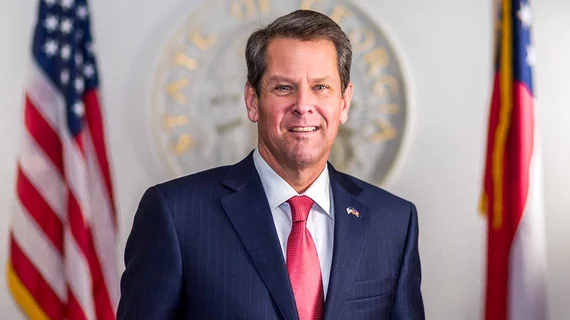State watch: Georgia adopts surprise medical billing law; NY providers fight liability shield pullback
Georgia has adopted legislation addressing surprise medical billing following final approval from Gov. Brian Kemp (R).
The Peach State leader on July 17 signed House Bill 888, which stipulates how health insurers should resolve payment disputes tied to out-of-network care. It also spells out arbitration proceedings if the two parties cannot settle on a final payment amount.
"This is a historic step forward for Georgia when it comes to healthcare, and frankly, it couldn't come at a better time—as our state and country face the greatest public health challenge we have seen in the 21st century," Kemp said in a statement.
The governor’s office said both political parties favored the bill, with lawmakers believing it “puts patients ahead of the status quo and provides a fair process for billing that medical providers and insurers can agree on.”
NY providers fight liability shield weakening
Radiologists, hospitals and other providers in the Empire State are fighting a bill that would water down liability protections during the COVID-19 pandemic.
Gov. Andrew Cuomo (D) first approved such protections via executive order back in March, granting docs and others immunity from civil liability claims for injury or death. However, companion bills in the New York State Senate and Assembly would pull back protections, Crain’s New York Business reported July 23.
Some state lawmakers believe the immunity granted by Cuomo was too broad, and in particular, pointed to scores of nursing home deaths during the crisis.
Meanwhile, hospitals and physicians believe a reversal could handcuff them in their work. Radiologist Bonnie Litvack, MD, said physician practices are already hurting from widespread drops in patient visits, and she’s worried that docs could be held liable for the adverse consequences of delaying procedures.
“The concern is that there will be a lot of second-guessing, opening up of the floodgates to litigation,” said Litvack, a breast imager and president of the Medical Society of the State of New York.
Lawmakers had discussed making the change retroactive but decided against it.
Almost 800 workers, including rad techs, strike in CA
More than 700 healthcare workers including radiologic technologists staged a five-day strike at Santa Rosa Memorial Hospital this month.
The union representing the healthcare workers claimed the California institution slashed jobs, cut corners on personal protective equipment and stockpiled cash during the pandemic.
“We don’t have enough PPE to keep us safe, but management wants us to pay twice as much to insure our families,” rad tech Shannon Signers said in a news item shared by the National Union of Healthcare Workers. “Our health has never been at greater risk. We need our hospital to support us, not squeeze us for every last dime during a pandemic.”
The five-day strike kicked off on July 20.
Parent company Providence St. Joseph Health operates Santa Rosa Memorial along with 50 other hospitals across seven states. The NUHW workers’ contract with the system expired more than a year ago, according to the Santa Rosa Press Democrat.
“We’re disappointed that the NUHW chose to strike during the pandemic. We’ve put a fair and generous wage and benefits offer on the table,” hospital spokesman Christian Hill told the newspaper.
PA power in ME
Finally, the Board of Licensure in Medicine and others in Maine have proposed a rule that would grant physician assistants more authority. More specifically, it would remove the mandatory doc supervision of PAs and modify the delegation agreement, the American College of Radiology reported July 22.

